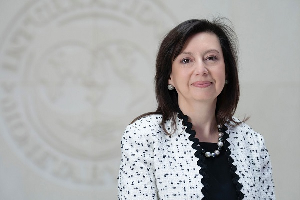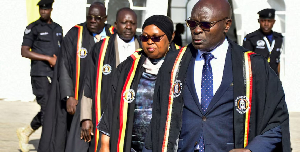The Ghana National Petroleum Corporation (GNPC) appreciates that at some point its capitalisation by the state has to end, but it needs security in order to raise money from the international capital market, officials of the corporation have said.
“You cannot raise money when you don’t have any security. Nobody will lend you money just because you are GNPC. Every bank will want to ensure that you have a means of paying back,” Thomas Manu, the corporation’s Director of Exploration and Development told the B&FT in reaction to calls for the corporation to raise money on its own for its equity financing and investment costs.
In its current state, the Petroleum Revenue Management Act does not give the GNPC direct control over the carried and participating interest of the country in petroleum licences.
The law says in part that, “For a period not exceeding fifteen years after the commence-ment of this Act ,the cash or the equivalent in barrels of oil ceded to a national oil company shall (a) not exceed 55% of the net cash flow from the carried and participating interests after deducting the equity financing cost.”
Head of Economic Evaluation at the GNPC, Ntow Amoah, said an amendment to this portion of the law may be required to give banks a clear indication as to what GNPC is entitled from the revenues it generates.
“If there isn’t much clarity about whether you have control over those assets, it is difficult to leverage those assets for financing; we have been working with banks over a long period and that is one of the critical issues. It is true that the Petroleum Revenue Management Act has a mechanism by which GNPC has access to revenues we ourselves have generated; but if it is not clear in terms of the administrative process of accessing it and the issue of whether you are holding it on your own behalf or on behalf of government and all that, then it is difficult to go and borrow,” he said.
Currently, all revenues generated by the corporation go to government first before it gets a share to run its business.
Government’s Total spending of oil revenues for 2011 and 2012 amounted to US$374.9million and US$517.5million respectively. This included US$207million allocated to the GNPC in 2011, comprising an equity financing cost of US$132.5million and an additional US$75.5million for investments. In 2012, a further US$230.9million was allocated to the corporation.
At a time government wants the corporation to become an independent operator at the upstream level in terms of exploring for oil and gas resources and developing them, how the corporation raises money is deemed critical.
In a recent report, which assesses the efficiency of oil revenue spending since 2011, the Africa Centre for Energy Policy (ACEP) argued that the monies given to the GNPC were depriving the national kitty of much needed revenues for development.
Executive Director of the think-tank, Mohammed Amin Adam, argued that Petrobras, the Brazilian state-owned oil company recently managed to raise some US$27billion from the capital market, a feat the GNPC must emulate.
But Ntow Amoah said raising money on its own is not beyond the GNPC except that it must be given some level of control over its resources. “Raising money is not a thing that we cannot do and in fact, that’s the way we should operate,” he said.
“When we sell the oil and get the revenue it does not come into our account; it goes into a Bank of Ghana account and then we have to get a letter to the Minister of Finance and the Controller and Accountant General comes in and all that, almost like a government process. It is not a corporate process. So the bank will look at that and say I can’t even have access to your money because the bank will typically want you to put some money of what you sell into the account. So if you do not have control over that process also, it makes raising money difficult, he added.
Thomas Manu also told the B&FT, that: “We acknowledge that there are so many competing demands on the national purse. We also acknowledge that GNPC needs some capitalisation. We also acknowledge that there are other options open for GNPC to raise money from the international capital market. But how do you do this? If the clarity of the carried interest is made clear that GNPC can hold it and use that as the basis of raising the money, I have no problem.”
Business News of Friday, 16 August 2013
Source: B&FT
GNPC needs security to raise money
Entertainment












